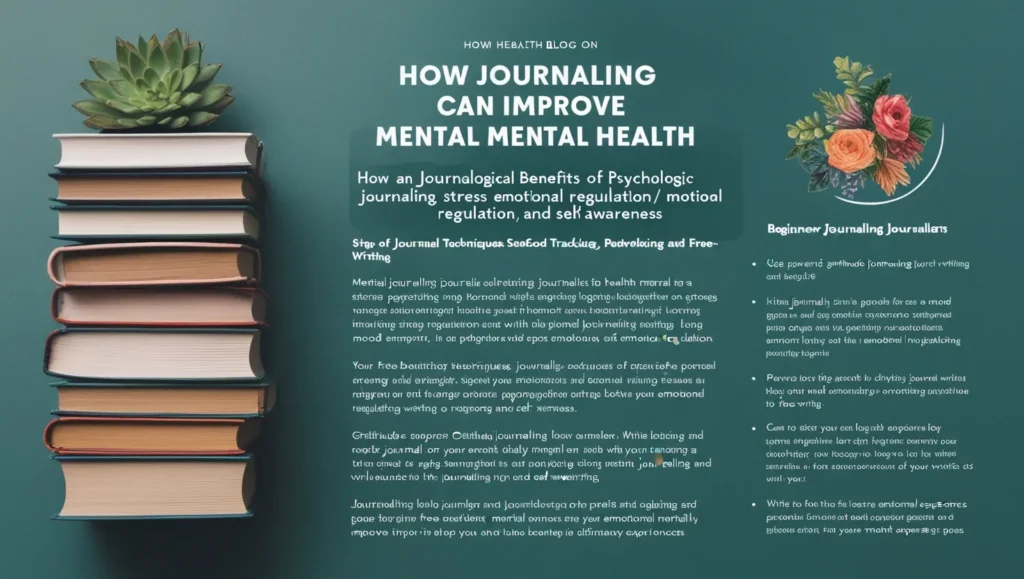Journaling Can Improve Your Mental Health
In today’s fast-paced world, our minds are constantly bombarded with thoughts, emotions, and stressors. Journaling Can Improve Your Mental Health Managing mental well-being can feel overwhelming, but there’s a simple, accessible, and highly effective tool that can help—journaling. Writing down your thoughts, feelings, and experiences can be a transformative practice, providing clarity, reducing anxiety, and improving emotional resilience.
This blog explores the science-backed benefits of journaling, different journaling techniques, and how you can start incorporating this powerful habit into your daily life for better mental health and emotional balance.
The Science Behind Journaling and Mental Health 🧠
Research shows that journaling has profound psychological benefits. Studies suggest that expressive writing helps:
✔ Reduce stress and anxiety – Writing about emotions helps process them, reducing the intensity of negative feelings.
✔ Boost mood and self-awareness – Journaling enhances emotional intelligence and provides insights into thought patterns.
✔ Strengthen memory and cognition – Putting thoughts into words improves recall, comprehension, and mental clarity.
✔ Improve emotional regulation – Identifying emotions on paper helps manage reactions to stress and triggers. Journaling Can Improve Your Mental Health
✔ Enhance problem-solving skills – Seeing problems written down allows for logical thinking and better decision-making.
Journaling is often recommended by therapists, psychologists, and mental health professionals as an effective tool for self-reflection and healing.
How Journaling Helps Your Mental Health 🌿✨
📝 1. Reduces Stress and Anxiety
Writing about your worries helps you offload mental burdens and gain perspective. Studies show that people who engage in expressive writing for just 15–20 minutes a day report lower stress levels.
💡 Try this: Write about a situation that’s causing you stress. Explore how it makes you feel and consider potential solutions.
🧘 2. Helps Process and Regulate Emotions
Journaling allows you to identify, understand, and process emotions rather than suppressing them. Journaling Can Improve Your Mental Health Recognizing patterns in your mood can help you take proactive steps toward self-care.
💡 Try this: Each day, note your emotions and what may have triggered them. Over time, you’ll see patterns and learn to manage emotional ups and downs.
🎯 3. Encourages Mindfulness and Self-Reflection
Writing about your day encourages mindfulness—staying present and aware. Reflecting on your actions, thoughts, and feelings fosters gratitude and self-compassion.
💡 Try this: End your journal entry by listing three things you’re grateful for each day. This helps shift focus toward positivity.
😴 4. Improves Sleep and Mental Clarity
If you struggle with racing thoughts at night, journaling can be a great way to clear your mind before bed. Journaling Can Improve Your Mental Health Writing down your worries helps you mentally “offload” them, leading to better sleep quality.
💡 Try this: Before bed, write down any worries, to-do lists, or thoughts that keep you awake. This helps create mental space for relaxation.
🚀 5. Boosts Self-Confidence and Motivation
Tracking your thoughts, progress, and achievements increases self-awareness and self-esteem. Seeing personal growth written down reinforces a sense of accomplishment.
💡 Try this: Keep a “wins” journal, where you record small achievements each day, from completing a task to overcoming a challenge.
💖 6. Helps Cope with Trauma and Emotional Healing
Journaling is widely used in therapy for processing trauma, grief, and difficult emotions. Writing about painful experiences in a structured way can promote emotional healing.
💡 Try this: If dealing with past trauma, start by writing in short sessions, focusing on feelings and self-compassion rather than reliving events in detail.
Types of Journaling for Mental Wellness 📖
Not sure where to start? Here are different journaling techniques to explore:
🔹 Gratitude Journal – Write down things you’re thankful for daily.
🔹 Mood Tracker – Log emotions and triggers to identify patterns.
🔹 Stream-of-Consciousness Writing – Free-write without judgment to release thoughts.
🔹 Goal-Oriented Journal – Set and track personal growth goals.
🔹 Letters to Yourself – Write to your past or future self for reflection and encouragement.
How to Start Journaling for Mental Health 🌟
📌 Step 1: Choose Your Medium
Use a physical notebook, digital app, or even voice recording—whatever feels natural.
📌 Step 2: Set a Routine
Start with 5–10 minutes a day to build the habit.
📌 Step 3: Write Freely
No rules! Let your thoughts flow without worrying about grammar or structure.
📌 Step 4: Be Honest and Non-Judgmental
Your journal is a safe space. Write openly without fear of criticism.
📌 Step 5: Reflect and Review
Look back on past entries to see growth and gain insights into your emotions.
Final Thoughts
Journaling is a powerful, low-cost, and accessible tool for improving mental health. Whether you want to reduce stress, gain clarity, or foster self-awareness, writing down your thoughts can create a positive shift in your emotional well-being.
Have you tried journaling for mental health? Share your experience or favorite journaling method in the comments!

